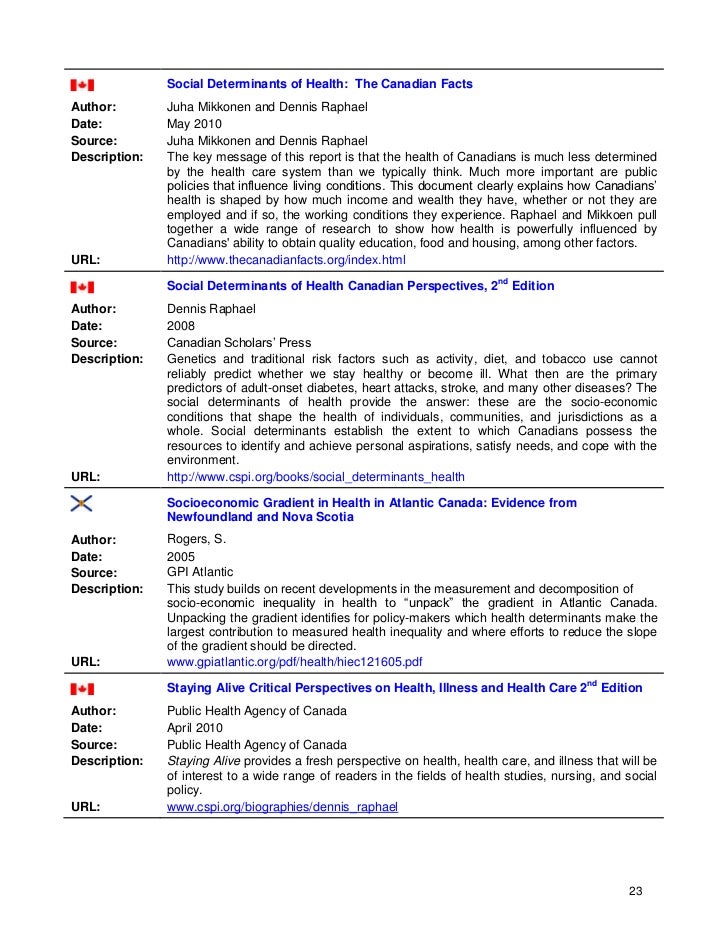Social Determinants Health Canadian Facts Pdf
Social determinants of health: The Canadian facts Mikkonen, J., & Raphael, D. 2010 Social Determinants of Health: The Canadian Facts provides an introduction to the social determinants of health in Canada, outlining why they are important and what can be done to improve their quality.
The authors provide illustrative data, discuss implications for healthy public policy, and offer recommendations for action to improve population health. Use this resource to:. Learn more about the social determinants of health in Canada. Facilitate discussion on the importance of public action to motivate social change Mikkonen, J., & Raphael, D. Social determinants of health: The Canadian facts.
Toronto, ON: York University School of Health Policy and Management. Retrieved from Tags:, Search Resources.
This document was prepared by the national collaborating centre for determinants of health for the national collaborating centres for public health. WHO Library Cataloguing in Publication Data Social determinants of health: the solid facts. 2 nd edition / edited by Richard Wilkinson and Michael Marmot. I find it an honour to write this Foreword to Social Determinants of Health: The Canadian Facts, a great initiative of our Canadian advocate for population.

Description: The primary factors that shape the health of Canadians are not medical treatments or lifestyle choices but rather the living conditions they experience. These conditions have come to be known as the social determinants of health. This information - based on decades of research and hundreds of studies in Canada and elsewhere - is unfamiliar to most Canadians. Canadians are largely unaware that our health is shaped by how income and wealth is distributed, whether or not we are employed and if so, the working conditions we experience. Our health is also determined by the health and social services we receive, and our ability to obtain quality education, food and housing, among other factors.
And contrary to the assumption that Canadians have personal control over these factors, in most cases these living conditions are - for better or worse - imposed upon us by the quality of the communities, housing situations, work settings, health and social service agencies, and educational institutions with which we interact. Social Determinants of Health: The Canadian Facts considers 14 social determinants of health. The publication outlines why they are important; how Canada is doing in addressing them; and what can be done to improve their quality. The purpose of the document is to provide promote greater awareness of the social determinants of health and the development and implementation of public policies that improve their quality. See pages 23-25 for Early Childhood Development as a social determinant of health. 'In regards to access to regulated childcare - an important contributor to child well-being - only 17% of Canadian families have access to regulated child care. Even in Quebec where an extensive effort is underway to provide regulated high quality childcare, only 25 percent of families have access to it.
The Organisation for Economic Co-operation and Development (OECD) published a report that rates Canada as last among 25 wealthy developed nations in meeting various early childhood development objectives. Canada is also one of the lowest spenders on early childhood education (Figure 7.2). A comprehensive OECD report ranked Canada 12th of 21 nations in children's health and well-being using a wide range of health indicators.' 'The quality of early childhood development is shaped by the economic and social resources available to parents. Government can provide a range of supports and benefits to children through family- friendly public policies. Researchers have even stated that establishing a comprehensive early childhood education program in Canada would be the single best means of improving Canadian health outcomes.'
Social Determinants Of Health Powerpoint
See pages 15-16 for Education as a social determinant of health. 'The manner by which education influences the population's health is shaped by public policies. For instance, if adequate income and necessary services such as childcare could be available to all, the health-threatening effects of having less education would be much less.' See pages 44-46 for Gender as a social determinant of health. 'In Canada, the other major concern in terms of gender inequality the first being the income gap is the lack of affordable and high quality daycare.
This forces women to stay at home more and take care of family responsibilities. Making affordable childcare available would increase women's possibilities to participate in working life. Single mothers are especially at high risk of entering poverty because of the lack of affordable childcare services and women's generally lower wages.' What are online documents? CRRU's online documents database contains thousands of resources relevant to ECEC policy and practice in Canada and internationally. CRRU's website allows the user to quickly search or browse the database of documents. Materials include: scholarly research, policy studies and briefs, government and NGO reports.
Is an archive of news articles about ECEC in Canada and abroad. Links to the full-text of materials are provided where publicly available; where access is restricted links are provided to abstracts, as well as purchase and subscription options.
The online document database is continually growing. New materials are added to the database each week and featured on the homepage as and.